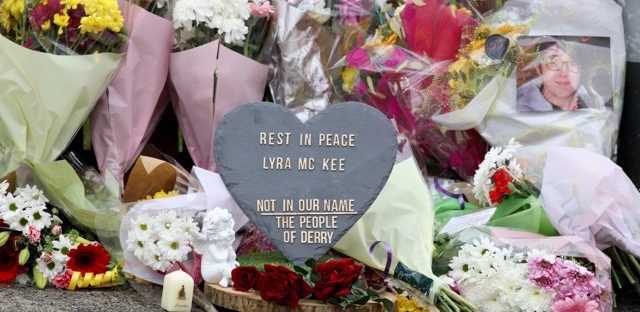Journalists and LGBT activists mourn as Lyra McKee is laid to rest
- Journalist, trade unionist and LGBT activist Lyra McKee was shot while covering a riot in the Creggan estate in Derry
- Her death has prompted protests all over the UK and Ireland
- Derry resident and Man Met journalism student Ruaidhri McCourt reflects on the tragic events of his home city

Derry is waking up with heavy hearts today knowing that a talented individual who was slain in the very streets where she lived was laid to rest yesterday.
Lyra was a hugely popular and talented part of our community. Although originally from Belfast, she fell in love with Derry and showcased its beauty and generosity through her work and writings on the city.
To the anger of thousands, it was on these streets that Lyra was murdered.

Like Lyra, I grew up in the generation she came to describe as ‘ceasefire babies’, those who were the first generation to grow up in an era of ‘peace’ while not fully getting to reap the benefits of it.
This was something that she wrote about in an article on the Good Friday Agreement: “With the signing of the Good Friday Agreement, my generation, the children and grandchildren of the civil rights protesters were told we would be the first to enjoy peace in decades. But just because we’re not at war any more doesn’t mean the shadow of the gunman has left the room.”
Like other journalists in the city, Lyra was out covering local stories for events taking place over Easter weekend in Creggan. Shortly before 8pm, just yards from where Lyra lived, rioting broke out after the police and British Army began a raid on a house in the area.
Many other residents just like Lyra came on to the streets to observe what was going on, something people back home do quite frequently. I’m not sure if were just nosey or we all have that natural journalist instinct to see events unfold for ourselves.

Personally, I had been watching a live stream on social media of the chaotic scenes that unfolded.
The rioting which took place in Creggan at first did not appear to be anything worse than what has been witnessed in recent years.
However, as the night went on the riot began to feel a lot more toxic as the violence only seemed to increase.
Shortly after 10pm, a gunman appeared in the crowd. Leaning from a corner, they fired a number of shots before screams horrifyingly echoed through the crowd.
“Someone’s been shot” a man standing beside Lyra roared at the top of his voice to try and desist any further shots from being fired. The riot quickly ceased after this.
In the days that followed we witnessed something almost unheard of in Northern Irish politics, where politicians on both divides stood in solidarity against those who murdered Lyra, alongside the thousands of individuals who wanted to send a clear message to the few that still use violence.
This coincided with numerous protests which took place across Ireland organised by the National Union of Journalists and LGBT groups who were mourning the death of an inspiration to both movements.

Many felt that Father Martin Magill, the priest who delivered Lyra’s funeral address, summed it up best: “I commend our political leaders for standing together in Creggan on Good Friday. I am, however , left with a question: why in God’s name does it take the death of a 29-year-old woman with her whole life in front of her to get to this point?”
For many of those unaware, politics for over the last two years in Northern Ireland has been at a stalemate with no functioning government, leaving many feeling disillusioned with the current political system, something Lyra was vocal about changing.
People such as Lyra were embodiments of change within Northern Ireland. She was someone who was not afraid to ask the hard questions while being an advocate for the rights of others.
We refuse to let Lyra’s death be in vain and pray she is the last person on the streets of Northern Ireland to meet their death in the way she did. We have to use Lyra as an example to others that violent actions have no benefit to the community, only bringing about pain and anguish. Lyra did not deserve to die in the manner that she did.
What we have witnessed in the last few days has shown the potential for real change to come about. We fought hard enough to achieve peace, something so fragile that we must try with every effort to continue to deliver, not just for Lyra or us, but for the future generations to grow up through the divided politics of where I call home.



